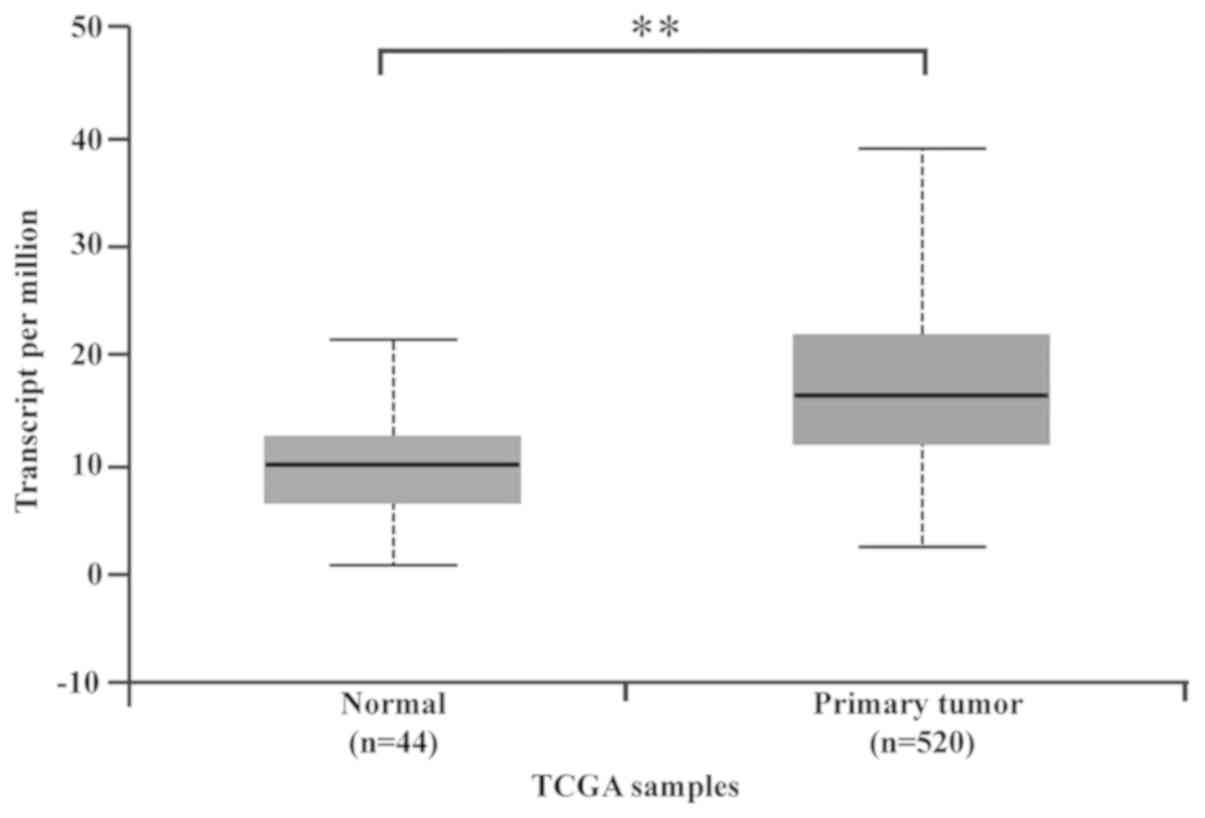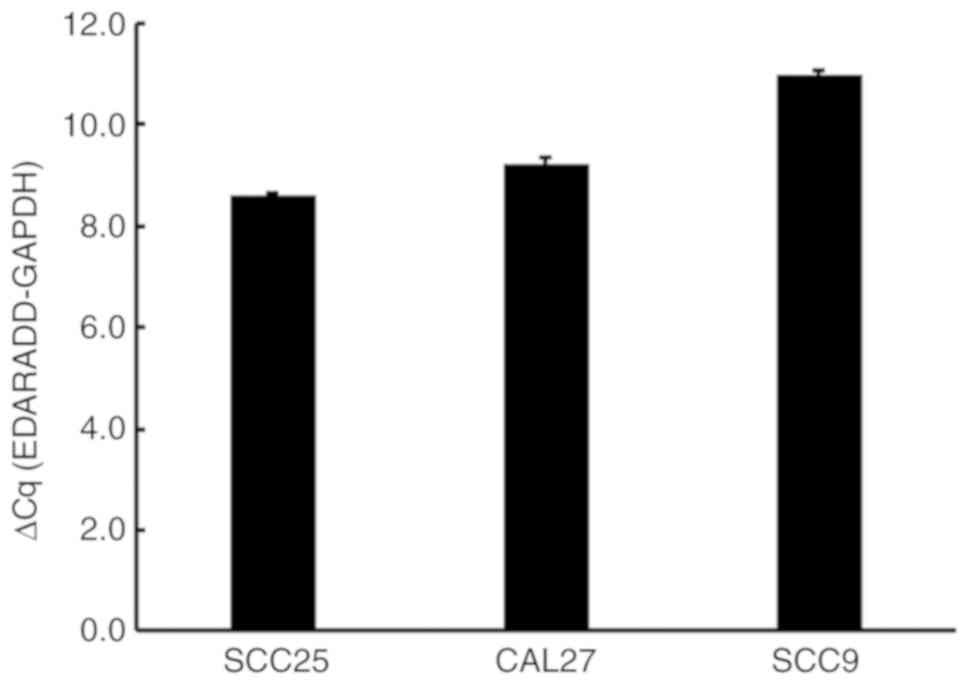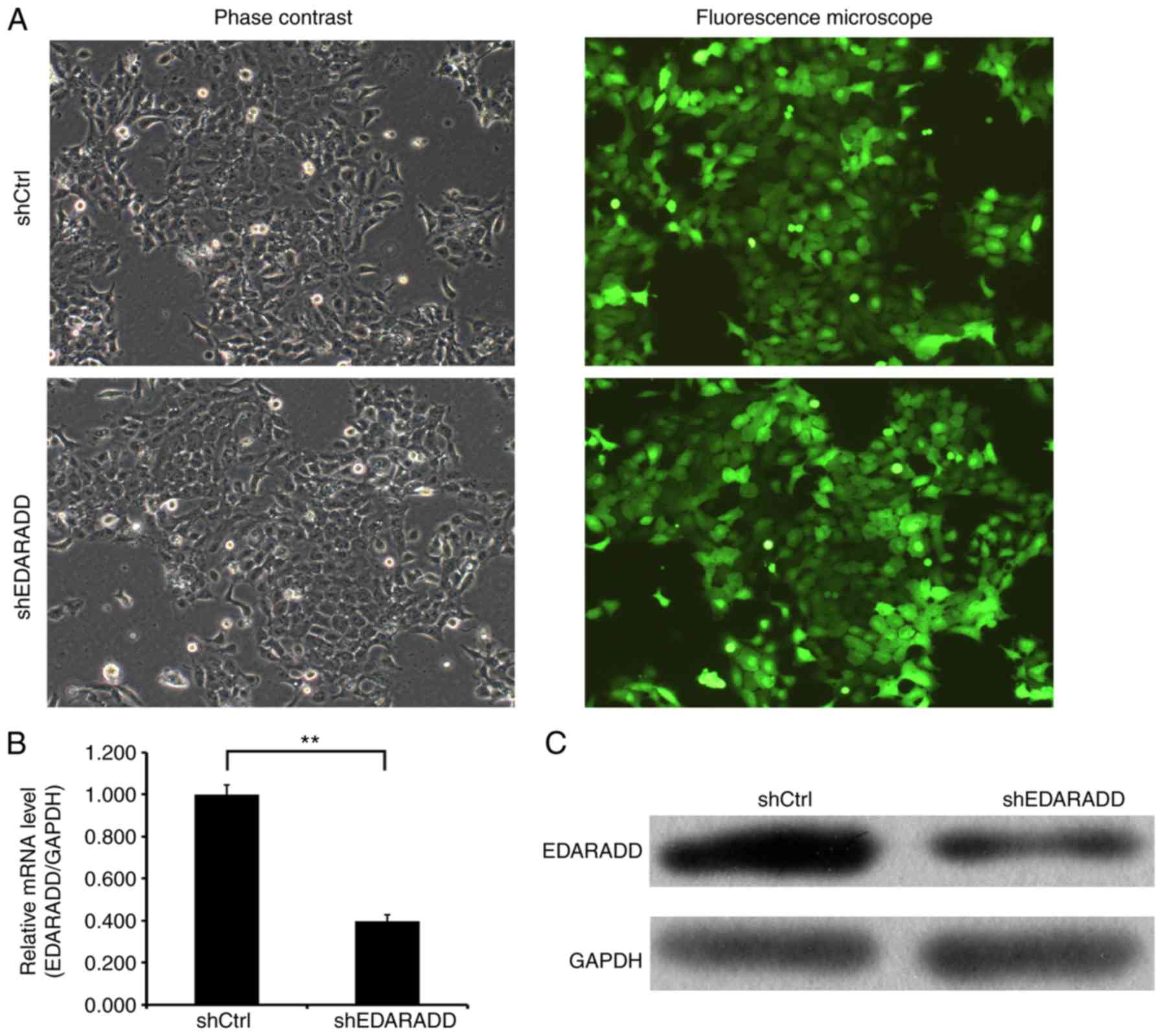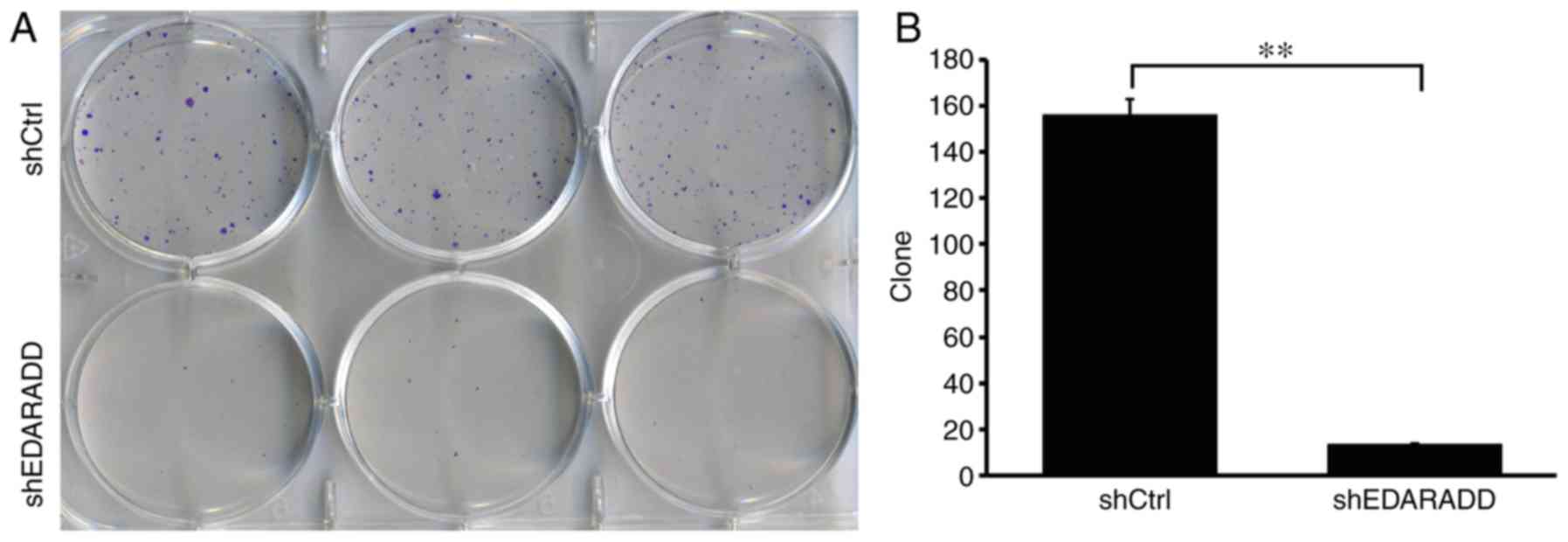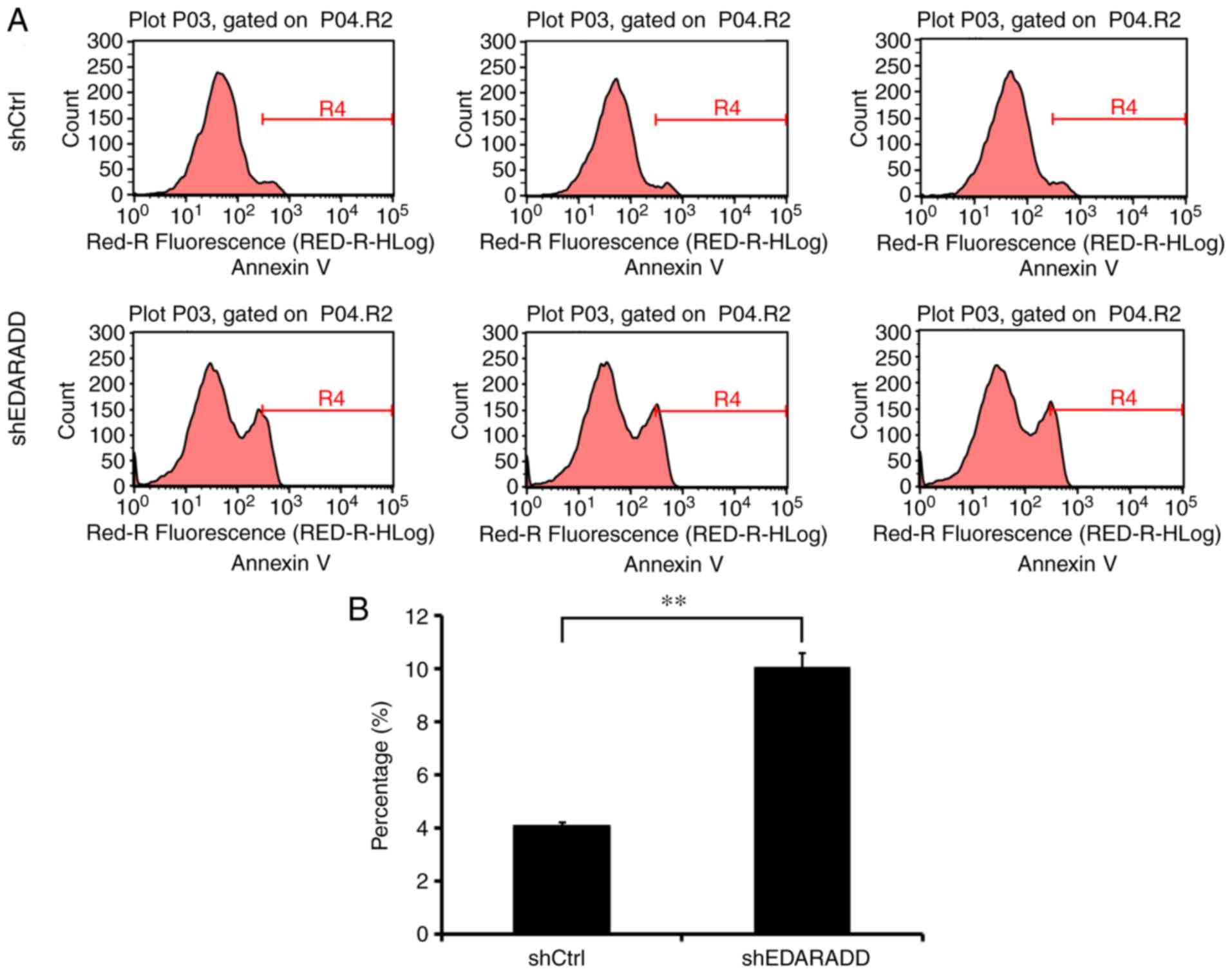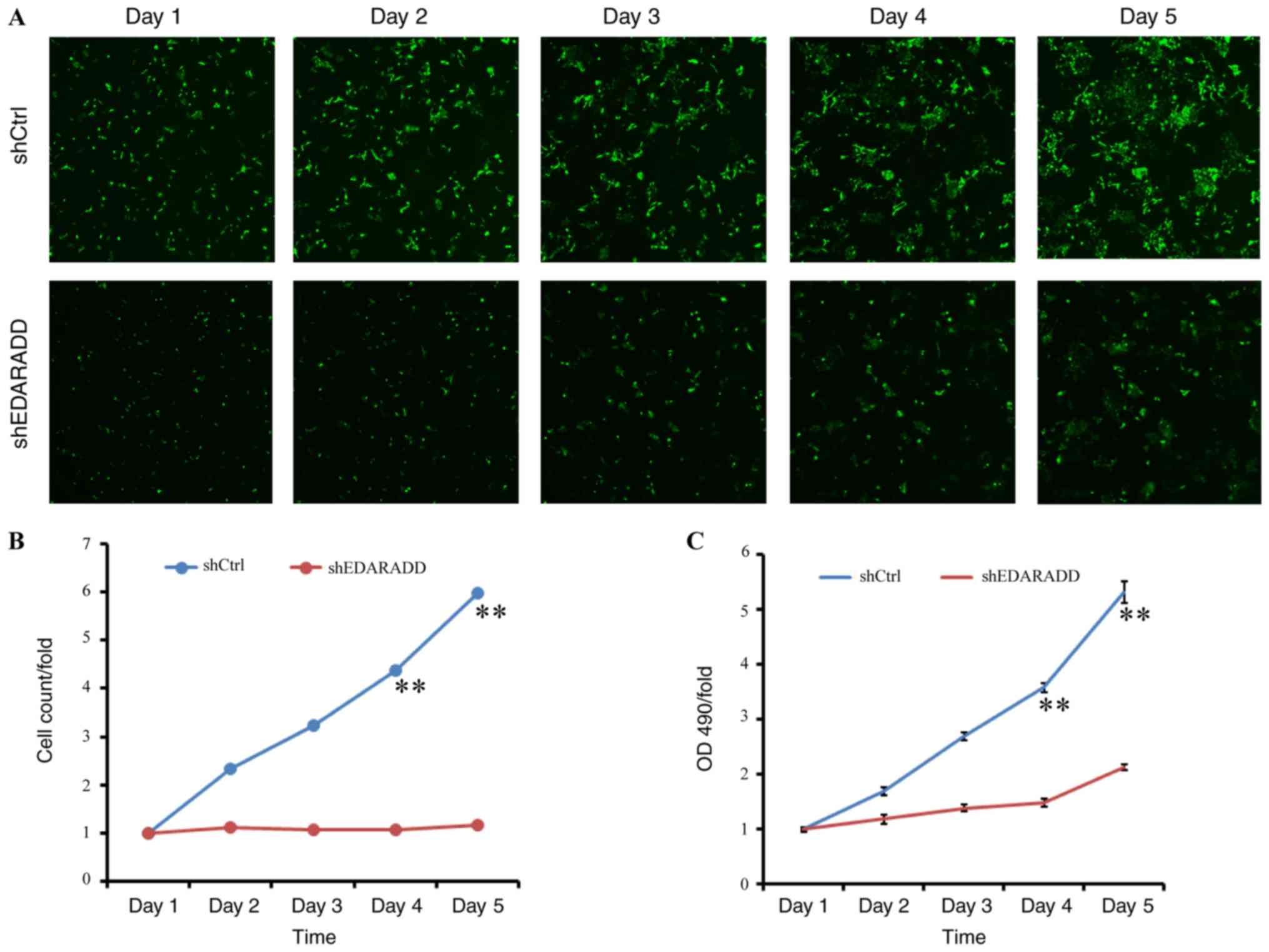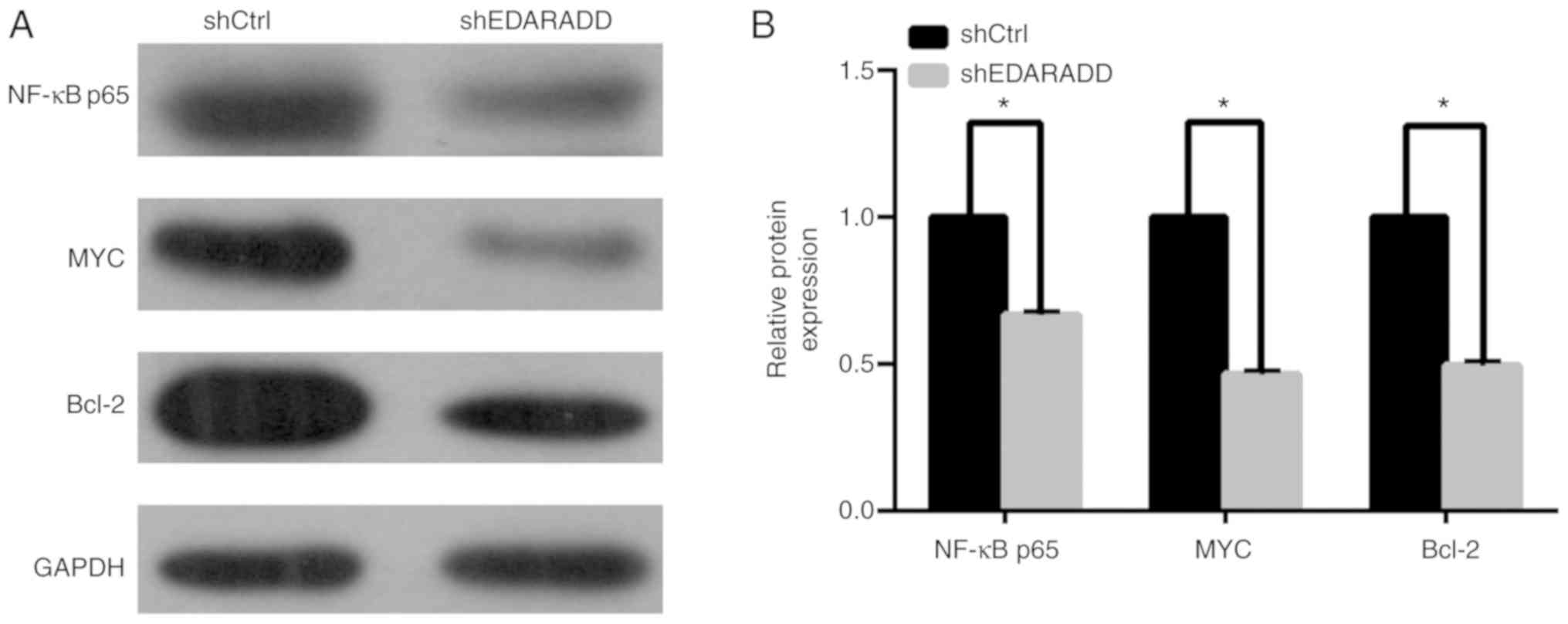|
1
|
Torre LA, Bray F, Siegel RL, Ferlay J,
Lortet-Tieulent J and Jemal A: Global cancer statistics, 2012. CA
Cancer J Clin. 65:87–108. 2015.PubMed/NCBI View Article : Google Scholar
|
|
2
|
Casiglia J and Woo SB: A comprehensive
review of oral cancer. Gen Dent. 49:72–82. 2001.PubMed/NCBI
|
|
3
|
Rosebush MS, Rao SK, Samant S, Gu W,
Handorf CR, Pfeffer LM and Nosrat CA: Oral cancer: Enduring
characteristics and emerging trends. J Mich Dent Assoc. 94:64–68.
2012.PubMed/NCBI
|
|
4
|
Karatas OF, Oner M, Abay A and Diyapoglu
A: MicroRNAs in human tongue squamous cell carcinoma: From
pathogenesis to therapeutic implications. Oral Oncol. 67:124–130.
2017.PubMed/NCBI View Article : Google Scholar
|
|
5
|
Xie N, Wang C, Liu X, Li R, Hou J, Chen X
and Huang H: Tumor budding correlates with occult cervical lymph
node metastasis and poor prognosis in clinical early-stage tongue
squamous cell carcinoma. J Oral Pathol Med. 44:266–272.
2015.PubMed/NCBI View Article : Google Scholar
|
|
6
|
Nóbrega TD, Queiroz SI, Santos EM, Costa
AL, Pereira-Pinto L and de Souza LB: Clinicopathological evaluation
and survival of patients with squamous cell carcinoma of the
tongue. Med Oral Patol Oral Cir Bucal. 23:e579–e587.
2018.PubMed/NCBI View Article : Google Scholar
|
|
7
|
Le Campion ACOV, Ribeiro CMB, Luiz RR, da
Silva Júnior FF, Barros HCS, Dos Santos KCB, Ferreira SJ, Gonçalves
LS and Ferreira SMS: Low survival rates of oral and oropharyngeal
squamous cell carcinoma. Int J Dent. 2017(5815493)2017.PubMed/NCBI View Article : Google Scholar
|
|
8
|
Shakeel Uz Zaman, Adeel M and Suhail A:
Squamous cell carcinoma of oral tongue in young patients-a 10 years
tertiary care experience. J Pak Med Assoc. 66:155–158.
2016.PubMed/NCBI
|
|
9
|
Zhang YY, Wang DC, Su JZ, Jia LF, Peng X
and Yu GY: Clinicopathological characteristics and outcomes of
squamous cell carcinoma of the tongue in different age groups. Head
Neck. 39:2276–2282. 2017.PubMed/NCBI View Article : Google Scholar
|
|
10
|
Tang Q, Cheng B, Xie M, Chen Y, Zhao J,
Zhou X and Chen L: Circadian clock gene bmal1 inhibits
tumorigenesis and increases paclitaxel sensitivity in tongue
squamous cell carcinoma. Cancer Res. 77:532–544. 2017.PubMed/NCBI View Article : Google Scholar
|
|
11
|
Feng Z, Xu QS, Qin LZ, Li H and Han Z:
Predicting radiotherapy necessity in tongue cancer using lymph Node
Yield. J Oral Maxillofac Surg. 75:1062–1070. 2017.PubMed/NCBI View Article : Google Scholar
|
|
12
|
Chen Y, Tian T, Mao MJ, Deng WY and Li H:
CRBP-1 over-expression is associated with poor prognosis in tongue
squamous cell carcinoma. BMC Cancer. 18(514)2018.PubMed/NCBI View Article : Google Scholar
|
|
13
|
Daigo K, Takano A, Thang PM, Yoshitake Y,
Shinohara M, Tohnai I, Murakami Y, Maegawa J and Daigo Y:
Characterization of KIF11 as a novel prognostic biomarker and
therapeutic target for oral cancer. Int J Oncol. 52:155–165.
2018.PubMed/NCBI View Article : Google Scholar
|
|
14
|
Shih CH, Chang YJ, Huang WC, Jang TH, Kung
HJ, Wang WC, Yang MH, Lin MC, Huang SF, Chou SW, et al:
EZH2-mediated upregulation of ROS1 oncogene promotes oral cancer
metastasis. Oncogene. 36:6542–6554. 2017.PubMed/NCBI View Article : Google Scholar
|
|
15
|
Li TK, Yin K, Chen Z, Bao Y and Zhang SX:
MiR-214 regulates oral cancer KB cell apoptosis through targeting
RASSF5. Genet Mol Res. 16(gmr16019327)2017.PubMed/NCBI View Article : Google Scholar
|
|
16
|
Bal E, Baala L, Cluzeau C, El Kerch F,
Ouldim K, Hadj-Rabia S, Bodemer C, Munnich A, Courtois G, Sefiani A
and Smahi A: Autosomal dominant anhidrotic ectodermal dysplasias at
the EDARADD locus. Hum Mutat. 28:703–709. 2007.PubMed/NCBI View Article : Google Scholar
|
|
17
|
Podzus J, Kowalczyk-Quintas C,
Schuepbach-Mallepell S, Willen L, Staehlin G, Vigolo M, Tardivel A,
Headon D, Kirby N, Mikkola ML, et al: Ectodysplasin a in biological
fluids and diagnosis of ectodermal dysplasia. J Dent Res.
96:217–224. 2017.PubMed/NCBI View Article : Google Scholar
|
|
18
|
Bergendal B, Klar J, Stecksén-Blicks C,
Norderyd J and Dahl N: Isolated oligodontia associated with
mutations in EDARADD, AXIN2, MSX1, and PAX9 genes. Am J Med Genet
A. 155A:1616–1622. 2011.PubMed/NCBI View Article : Google Scholar
|
|
19
|
Arzoo PS, Klar J, Bergendal B, Norderyd J
and Dahl N: WNT10A mutations account for ¼ of population-based
isolated oligodontia and show phenotypic correlations. Am J Med
Genet A. 164A:353–359. 2014.PubMed/NCBI View Article : Google Scholar
|
|
20
|
Chandrashekar DS, Bashel B, Balasubramanya
SAH, Creighton CJ, Ponce-Rodriguez I, Chakravarthi BVSK and
Varambally S: UALCAN: A portal for facilitating tumor subgroup gene
expression and survival analyses. Neoplasia. 19:649–658.
2017.PubMed/NCBI View Article : Google Scholar
|
|
21
|
Boeker M, França F, Bronsert P and Schulz
S: TNM-O: Ontology support for staging of malignant tumours. J
Biomed Semantics. 7(64)2016.PubMed/NCBI View Article : Google Scholar
|
|
22
|
Livak KJ and Schmittgen TD: Analysis of
relative gene expression data using real-time quantitative PCR and
the 2(-Delta Delta C(T)) method. Methods. 25:402–408.
2001.PubMed/NCBI View Article : Google Scholar
|
|
23
|
Hashibe M, Brennan P, Chuang SC, Boccia S,
Castellsague X, Chen C, Curado MP, Dal Maso L, Daudt AW, Fabianova
E, et al: Interaction between tobacco and alcohol use and the risk
of head and neck cancer: Pooled analysis in the international head
and neck cancer epidemiology consortium. Cancer Epidemiol
Biomarkers Prev. 18:541–550. 2009.PubMed/NCBI View Article : Google Scholar
|
|
24
|
Cancer Genome Atlas Network: Comprehensive
genomic characterization of head and neck squamous cell carcinomas.
Nature 517: 576-582, 2015.
|
|
25
|
Tuna M, Amos CI and Mills GB: Genome-wide
analysis of head and neck squamous cell carcinomas reveals HPV,
TP53, smoking and alcohol-related allele-based acquired uniparental
disomy genomic alterations. Neoplasia. 21:197–205. 2019.PubMed/NCBI View Article : Google Scholar
|
|
26
|
Mohideen K, Krithika C, Jeddy N, Bharathi
R, Thayumanavan B and Sankari SL: Meta-analysis on risk factors of
squamous cell carcinoma of the tongue in young adults. J Oral
Maxillofac Pathol. 23:450–457. 2019.PubMed/NCBI View Article : Google Scholar
|
|
27
|
Jeon JH, Kim MG, Park JY, Lee JH, Kim MJ,
Myoung H and Choi SW: Analysis of the outcome of young age tongue
squamous cell carcinoma. Maxillofac Plast Reconstr Surg.
39(41)2017.PubMed/NCBI View Article : Google Scholar
|
|
28
|
Zhou HY, Shu HY, Dai J, Li HC, Tang L,
Wang HW and Ni B: Maternal genetic backgrounds contribute to the
genetic susceptibility of tongue cancer patients in Hunan, central
of China. Mitochondrial DNA A DNA Mapp Seq Anal. 29:347–352.
2018.PubMed/NCBI View Article : Google Scholar
|
|
29
|
Haeggblom L, Ramqvist T, Tommasino M,
Dalianis T and Näsman A: Time to change perspectives on HPV in
oropharyngeal cancer. A systematic review of HPV prevalence per
oropharyngeal sub-site the last 3 years. Papillomavirus Res.
4:1–11. 2017.PubMed/NCBI View Article : Google Scholar
|
|
30
|
Ribeiro IP, Rodrigues JM, Mascarenhas A,
Kosyakova N, Caramelo F, Liehr T, Melo JB and Carreira IM:
Cytogenetic, genomic, and epigenetic characterization of the HSC-3
tongue cell line with lymph node metastasis. J Oral Sci. 60:70–81.
2018.PubMed/NCBI View Article : Google Scholar
|
|
31
|
Bai Y, Cui X, Gao D, Wang Y, Wang B and
Wang W: Golgi integral membrane protein 4 manipulates cellular
proliferation, apoptosis, and cell cycle in human head and neck
cancer. Biosci Rep: Aug 31, 2018 (Epub ahead of print). doi:
10.1042/BSR20180454.
|
|
32
|
Chen G, Zhang Y, Liang J, Li W, Zhu Y,
Zhang M, Wang C and Hou J: Deregulation of hexokinase II is
associated with glycolysis, autophagy, and the
epithelial-mesenchymal transition in tongue squamous cell carcinoma
under hypoxia. Biomed Res Int. 2018(8480762)2018.PubMed/NCBI View Article : Google Scholar
|
|
33
|
Ramos GO, Meyer GL, Visioli F, Manoela MD
and Oliveira MG: Carcinoma cuniculatum in the tongue of a patient
with oral lichen planus: Unusual presentation. Indian J Dent Res.
29:525–528. 2018.PubMed/NCBI View Article : Google Scholar
|
|
34
|
Vigneswaran N and Williams MD:
Epidemiologic trends in head and neck cancer and aids in diagnosis.
Oral Maxillofac Surg Clin North Am. 26:123–141. 2014.PubMed/NCBI View Article : Google Scholar
|
|
35
|
Zhang B, Li KY, Chen HY, Pan SD, Jiang LC,
Wu YP and Liu SW: Spindle and kinetochore associated complex
subunit 1 regulates the proliferation of oral adenosquamous
carcinoma CAL-27 cells in vitro. Cancer Cell Int.
13(83)2013.PubMed/NCBI View Article : Google Scholar
|
|
36
|
Xu S, Ma D, Zhuang R, Sun W, Liu Y, Wen J
and Cui L: DJ-1 is upregulated in oral squamous cell carcinoma and
promotes oral cancer cell proliferation and invasion. J Cancer.
7:1020–1028. 2016.PubMed/NCBI View Article : Google Scholar
|
|
37
|
Kumar A, Eby MT, Sinha S, Jasmin A and
Chaudhary PM: The ectodermal dysplasia receptor activates the
nuclear factor-kappaB, JNK, and cell death pathways and binds to
ectodysplasin A. J Biol Chem. 276:2668–2677. 2001.PubMed/NCBI View Article : Google Scholar
|
|
38
|
Vial J, Royet A, Cassier P, Tortereau A,
Dinvaut S, Maillet D, Gratadou-Hupon L, Creveaux M, Sadier A,
Tondeur G, et al: The ectodysplasin receptor EDAR acts as a tumor
suppressor in melanoma by conditionally inducing cell death. Cell
Death Differ. 26:443–454. 2019.PubMed/NCBI View Article : Google Scholar
|
|
39
|
Chen YT, Liu HC, Han D, Liu Y and Feng HL:
Association between EDAR polymorphisms and non-syndromic tooth
agenesis in the chinese han population. Chin J Dent Res.
20:153–159. 2017.PubMed/NCBI View Article : Google Scholar
|
|
40
|
Suda N, Bazar A, Bold O, Jigjid B,
Garidkhuu A, Ganburged G and Moriyama K: A mongolian patient with
hypohidrotic ectodermal dysplasia with a novel P121S variant in
EDARADD. Orthod Craniofac Res. 13:114–117. 2010.PubMed/NCBI View Article : Google Scholar
|
|
41
|
Chassaing N, Cluzeau C, Bal E, Guigue P,
Vincent MC, Viot G, Ginisty D, Munnich A, Smahi A and Calvas P:
Mutations in EDARADD account for a small proportion of hypohidrotic
ectodermal dysplasia cases. Br J Dermatol. 162:1044–1048.
2010.PubMed/NCBI View Article : Google Scholar
|
|
42
|
Masui Y, Farooq M, Sato N, Fujimoto A,
Fujikawa H, Ito M and Shimomura Y: A missense mutation in the death
domain of EDAR abolishes the interaction with EDARADD and underlies
hypohidrotic ectodermal dysplasia. Dermatology. 223:74–79.
2011.PubMed/NCBI View Article : Google Scholar
|
|
43
|
Wohlfart S, Söder S, Smahi A and Schneider
H: A novel missense mutation in the gene EDARADD associated with an
unusual phenotype of hypohidrotic ectodermal dysplasia. Am J Med
Genet A. 170A:249–253. 2016.PubMed/NCBI View Article : Google Scholar
|
|
44
|
Sadier A, Lambert E, Chevret P, Décimo D,
Sémon M, Tohmé M, Ruggiero F, Ohlmann T, Pantalacci S and Laudet V:
Tinkering signaling pathways by gain and loss of protein isoforms:
The case of the EDA pathway regulator EDARADD. BMC Evol Biol.
15(129)2015.PubMed/NCBI View Article : Google Scholar
|
|
45
|
Courtois G and Gilmore TD: Mutations in
the NF-kappaB signaling pathway: Implications for human disease.
Oncogene. 25:6831–6843. 2006.PubMed/NCBI View Article : Google Scholar
|
|
46
|
Wang Y, Lin Z, Sun L, Fan S, Huang Z,
Zhang D, Yang Z, Li J and Chen W: Akt/Ezrin Tyr353/NF-κB pathway
regulates EGF-induced EMT and metastasis in tongue squamous cell
carcinoma. Br J Cancer. 110:695–705. 2014.PubMed/NCBI View Article : Google Scholar
|
|
47
|
He HJ, Bing H and Liu G: TSR2 induces
laryngeal cancer cell apoptosis through inhibiting NF-κB signaling
pathway. Laryngoscope. 128:E130–E134. 2018.PubMed/NCBI View Article : Google Scholar
|
|
48
|
Shishodia S and Aggarwal BB: Nuclear
factor-kappaB: A friend or a foe in cancer? Biochem Pharmacol.
68:1071–1680. 2004.PubMed/NCBI View Article : Google Scholar
|
|
49
|
Charbonneau B, Block MS, Bamlet WR,
Vierkant RA, Kalli KR, Fogarty Z, Rider DN, Sellers TA, Tworoger
SS, Poole E, et al: Risk of ovarian cancer and the NF-κB pathway:
Genetic association with IL1A and TNFSF10. Cancer Res. 74:852–861.
2014.PubMed/NCBI View Article : Google Scholar
|
|
50
|
Hoesel B and Schmid JA: The complexity of
NF-κB signaling in inflammation and cancer. Mol Cancer.
12(86)2013.PubMed/NCBI View Article : Google Scholar
|
|
51
|
Zeligs KP, Neuman MK and Annunziata CM:
Molecular pathways: The balance between cancer and the immune
system challenges the therapeutic specificity of targeting nuclear
factor-κB signaling for cancer treatment. Clin Cancer Res.
22:4302–4308. 2016.PubMed/NCBI View Article : Google Scholar
|
|
52
|
Zeng S, Zhao X, Xu LS, Yang D, Chen L and
Xu MH: Apoptosis induction effect of Apocynum venetum polyphenol on
human U87 glioma cells via NF-κB pathway. Future Oncol.
15:3723–3738. 2019.PubMed/NCBI View Article : Google Scholar
|
|
53
|
Giridharan S and Srinivasan M: Mechanisms
of NF-κB p65 and strategies for therapeutic manipulation. J Inflamm
Res. 11:407–419. 2018.PubMed/NCBI View Article : Google Scholar
|
|
54
|
Wei H, Li J, Li Y and Song J: MicroRNA-451
inhibits inflammation and proliferation of glomerular mesangial
cells through down-regulating PSMD11 and NF-κB p65. Biosci Rep.
39(BSR20191455)2019.PubMed/NCBI View Article : Google Scholar
|
|
55
|
Cai L, Li CM, Chen WN, Qiu YY, Guo YL and
Li R: Penta-acetyl geniposide induces apoptosis of fibroblast-like
synoviocytes from adjuvant-induced arthritis rats in vitro,
associated with inhibition of NF-κB activation. Pharmacol Rep.
71:1006–1013. 2019.PubMed/NCBI View Article : Google Scholar
|
|
56
|
Adams JM and Cory S: The Bcl-2 protein
family: Arbiters of cell survival. Science. 281:1322–1326.
1998.PubMed/NCBI View Article : Google Scholar
|
|
57
|
Zhao M, Zhang Y, Li J, Li X, Cheng N, Wang
Q, Cai W, Zhao C, He Y, Chang J and Zhou C: Histone deacetylation,
as opposed to promoter methylation, results in epigenetic BIM
silencing and resistance to EGFR TKI in NSCLC. Oncol Lett.
15:1089–1096. 2018.PubMed/NCBI View Article : Google Scholar
|
|
58
|
Dang CV: c-Myc target genes involved in
cell growth, apoptosis, and metabolism. Mol Cell Biol. 19:1–11.
1999.PubMed/NCBI View Article : Google Scholar
|
|
59
|
Hao YH, Lafita-Navarro MC, Zacharias L,
Borenstein-Auerbach N, Kim M, Barnes S, Kim J, Shay J, DeBerardinis
RJ and Conacci-Sorrell M: Induction of LEF1 by MYC activates the
WNT pathway and maintains cell proliferation. Cell Commun Signal.
17(129)2019.PubMed/NCBI View Article : Google Scholar
|
|
60
|
Farria AT, Mustachio LM, Akdemir ZHC and
Dent SYR: GCN5 HAT inhibition reduces human Burkitt lymphoma cell
survival through reduction of MYC target gene expression and
impeding BCR signaling pathways. Oncotarget. 10:5847–5858.
2019.PubMed/NCBI View Article : Google Scholar
|
|
61
|
Jiang H, Li Y, Li J, Zhang X, Niu G, Chen
S and Yao S: Long noncoding RNA LSINCT5 promotes endometrial
carcinoma cell proliferation, cycle, and invasion by promoting the
Wnt/β-catenin signaling pathway via HMGA2. Ther Adv Med Oncol.
11(1758835919874649)2019.PubMed/NCBI View Article : Google Scholar
|
|
62
|
Ma JX, Sun YL, Yu Y, Zhang J, Wu HY and Yu
XF: Triptolide enhances the sensitivity of pancreatic cancer PANC-1
cells to gemcitabine by inhibiting TLR4/NF-κB signaling. Am J
Transl Res. 11:3750–3760. 2019.PubMed/NCBI
|
|
63
|
Tanaka K, Tanaka T, Nakano T, Hozumi Y,
Yanagida M, Araki Y, Iwazaki K, Takagi M and Goto K: Knockdown of
DEAD-box RNA helicase DDX5 selectively attenuates serine 311
phosphorylation of NF-κB p65 subunit and expression level of
anti-apoptotic factor Bcl-2. Cell Signal. 65(109428)2019.PubMed/NCBI View Article : Google Scholar
|
|
64
|
Wang M, Zeng X, Li S, Sun Z, Yu J, Chen C,
Shen X, Pan W and Luo H: A novel tanshinone analog exerts
anti-cancer effects in prostate cancer by inducing cell apoptosis,
arresting cell cycle at G2 phase and blocking metastatic ability.
Int J Mol Sci. 20(E4459)2019.PubMed/NCBI View Article : Google Scholar
|
|
65
|
Zhang S, Ma H, Zhang D, Xie S, Wang W, Li
Q, Lin Z and Wang Y: LncRNA KCNQ1OT1 regulates proliferation and
cisplatin resistance in tongue cancer via miR-211-5p mediated
Ezrin/Fak/Src signaling. Cell Death Dis. 9(742)2018.PubMed/NCBI View Article : Google Scholar
|
|
66
|
Zhao L, Li P, Zhao L, Wang M, Tong D, Meng
Z, Zhang Q, Li Q and Zhang F: Expression and clinical value of
PD-L1 which is regulated by BRD4 in tongue squamous cell carcinoma.
J Cell Biochem. 121:1855–1869. 2020.PubMed/NCBI View Article : Google Scholar
|
|
67
|
Huang L, Song F, Sun H, Zhang L and Huang
C: IRX5 promotes NF-κB signalling to increase proliferation,
migration and invasion via OPN in tongue squamous cell carcinoma. J
Cell Mol Med 2018 (Epub ahead of print).
|
|
68
|
Yang N, Gao J, Cheng X, Hou C, Yang Y, Qiu
Y, Xu M, Zhang Y and Huang S: Grape seed proanthocyanidins inhibit
the proliferation, migration and invasion of tongue squamous cell
carcinoma cells through suppressing the protein kinase B/nuclear
factor-κB signaling pathway. Int J Mol Med. 40:1881–1888.
2017.PubMed/NCBI View Article : Google Scholar
|
|
69
|
Shi Y, Wu WZ, Huo A, Zhou W and Jin XH:
Isobavachalcone inhibits the proliferation and invasion of tongue
squamous cell carcinoma cells. Oncol Lett. 14:2852–2858.
2017.PubMed/NCBI View Article : Google Scholar
|















